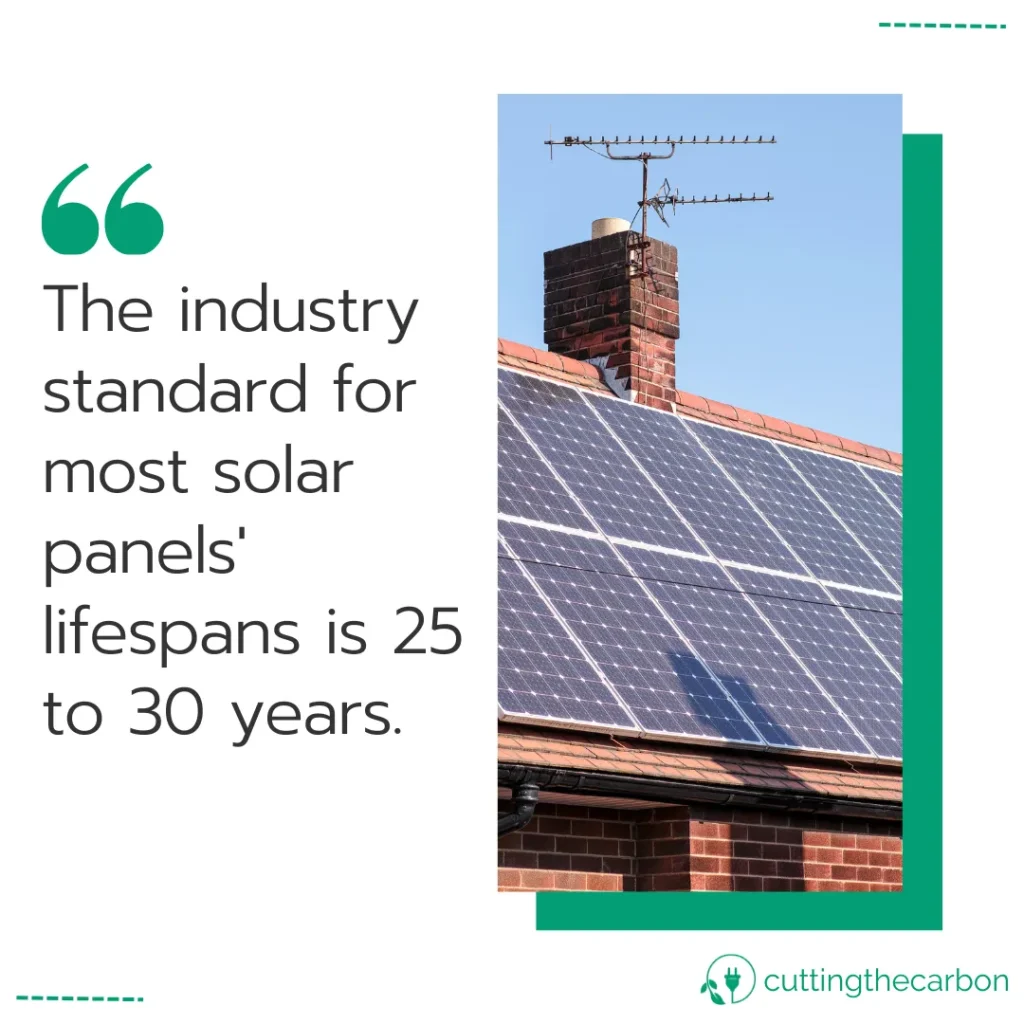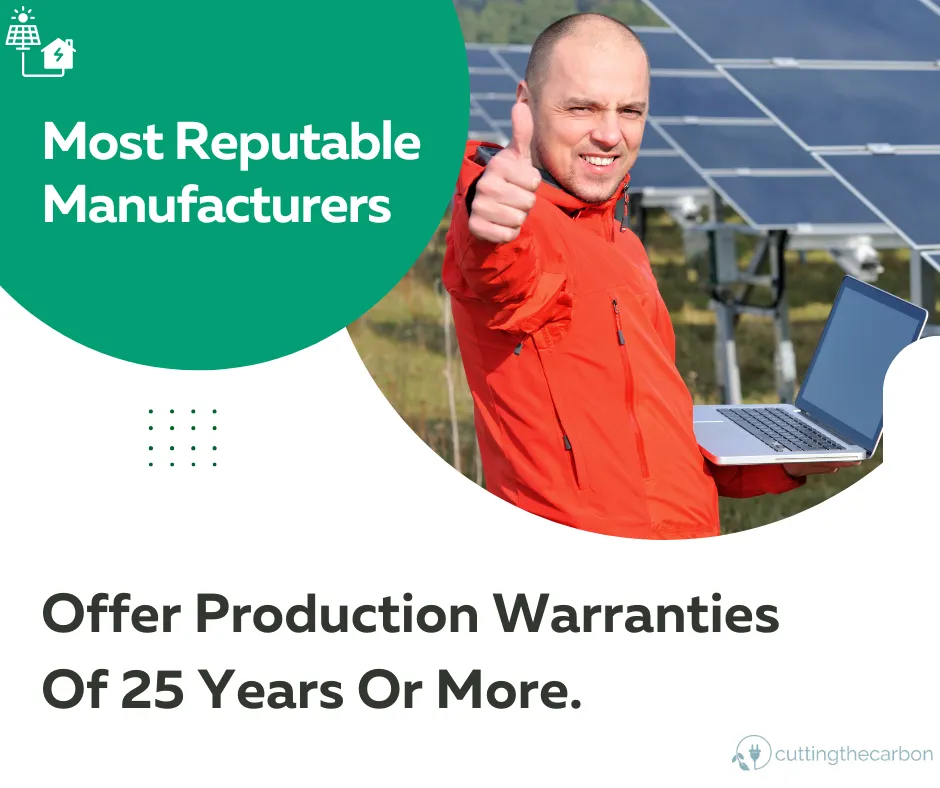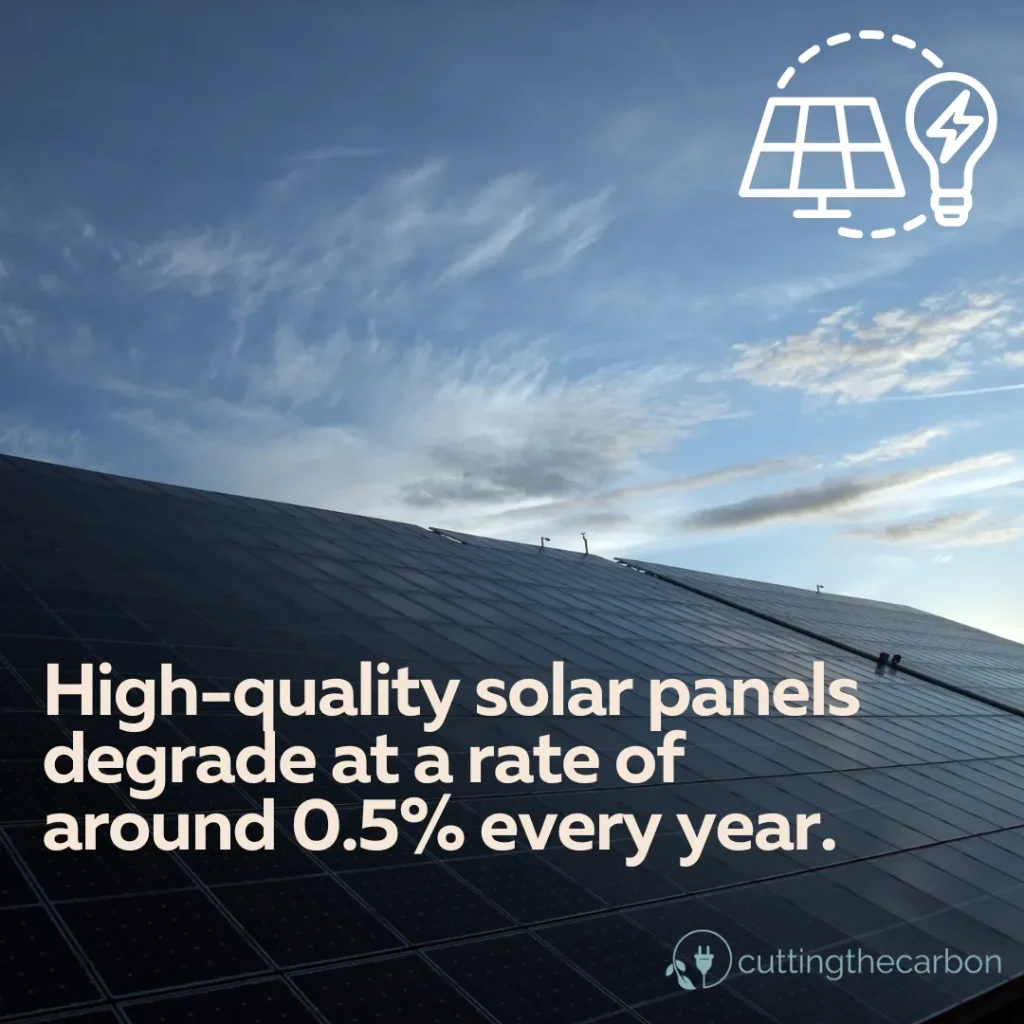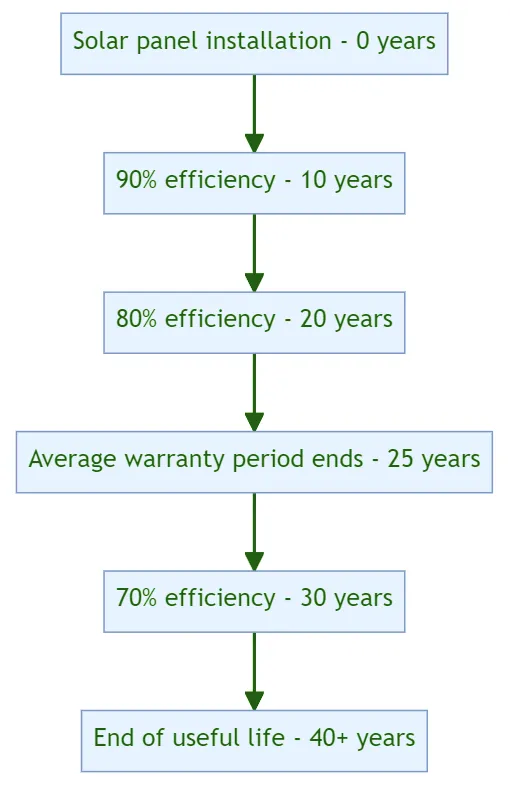How long do solar panels last in the UK, you ask? It’s a question that has been on the minds of many environmentally-conscious Brits.
Determining the longevity of solar panels in the UK can be a challenge. Especially when deliberating on such a major outlay for your home or business.
Transitioning to green energy with solar power isn’t just about reducing your carbon footprint anymore. It’s also about making smart financial decisions.

How Long Do Solar Panels Last On Average Summary Table
| Factor | Description |
|---|---|
| Standard Lifespan | The industry standard for most solar panels’ lifespans is between 25 to 30 years. |
| Warranty Duration | Most reputable manufacturers offer production warranties for 25 years or more. |
| Break-Even Point | The average break-even point for solar panel energy savings occurs six to 10 years after installation. |
| Degradation Rate | The average solar panel loses about 0.8% of its output each year. |
| Post-Lifespan Efficiency | Even after their standard lifespan, solar panels don’t stop working but can lose significant efficiency. |
It’s essential to note that while solar panels have a standard lifespan, their actual longevity can vary based on factors like maintenance, quality, and environmental conditions. Always consult a solar professional to get a more accurate estimate for your panels and situation.
The Lifespan of Solar Panels in the UK
Modern solar photovoltaic panels installed today have a life expectancy stretching from 25-30 years, while some state-of-the-art models can even outlive this average lifespan and last up to 40-50 years.
In temperate climates such as ours here in the UK, these impressive figures are further amplified by performance levels which remain at around 96% after twenty long years.
So they are doing their bit for Mother Earth and proving themselves as economically sound investments over time – reducing your carbon footprint and reducing your energy bill.
Solar Panel Warranties
When discussing the longevity of solar panel systems includes understanding warranties offered with installations. These guarantees act like safety nets ensuring consistent panel output throughout its lifetime while providing reassurance about your investment into renewable sources.
A typical warranty ensures no less than 90% production during the first decade, then slightly dips down, guaranteeing approximately an output level of around 80% once we hit year twenty-five.
This perfectly aligns with our previously mentioned industry-standard life expectancy, making them viable contenders for sustainable alternatives for powering homes or businesses.
To shed more light on what influences these numbers, let’s look at the different types of solar technologies available, adopted maintenance and cleaning practices, and other factors contributing towards maintaining optimal efficiency across your system’s entire lifecycle.

Types of Solar Panels and Their Lifespans
The UK solar panel market has varied options to fulfil various energy requirements. The two most prevalent types are monocrystalline and polycrystalline solar panels.
Monocrystalline Solar Panels
Monocrystalline panels, typically known for their superior technology, promise an extended lifespan.
Composed of single-crystal silicon, they provide higher efficiency rates due to more room for electrons’ movement resulting in enhanced performance over long periods that can surpass 25 years with adequate care.
Polycrystalline Solar Panels
In contrast, polycrystalline solar panels may not boast such longevity despite being less costly with lower waste during production; these multi-silicon fragment units offer reduced efficiency levels, translating into slightly shorter lifespans than monocrystals.
When considering your investment into green solutions like solar PV panel installation, you must choose what best fits your home’s energy requirements while also factoring in how long you plan to stay at your current residence.
Lifespan Factors Beyond Panel Type
Beyond just choosing between mono or poly crystallines, other factors influence your system’s life expectancy, including quality installation or local weather conditions, among others.
Therefore seeking professional help becomes indispensable in ensuring optimal performance throughout its lifetime, whether it be a free consultation about suitability assessment based on needs budgeting or even arranging professional installations.
How Long Do Solar Panels Last? Explanation Video
The Role of Inverters and Batteries in Solar Energy Systems
In the world of solar energy, inverters play a pivotal role. They’re responsible for converting the sun’s DC electricity into your home appliances’ AC power. However, it’s worth noting that these devices typically have a lifespan shorter than your panels – around 10-12 years.
Like how you’d monitor any other investment, keeping an eye on your system’s performance is essential. Keeping track of your system is key, so you’ll know when to change or service the inverter.
Solar Panel Batteries: Enhancing Energy Storage
Moving beyond daylight hours’ production capacity, many modern solar PV panel installations now include batteries for storing excess energy produced during peak sunlight periods. These reserves become handy, providing electricity even after sunset or during less sunny spells.
Batteries from reputable providers offer reliable storage solutions lasting up to two decades under optimal conditions. Integrating such batteries into your setup maximises its functionality and extends usability over long periods.

Making Your Solar Panels Last Longer
Ensuring the sustained operation of your solar panels is imperative for fully using this technology.
Here are some steps you can take for a long-lasting, efficient system:
Regular Cleaning and Maintenance
The efficiency of your solar panels installed today can be significantly affected by dirt and debris accumulation over time. This obstruction reduces sunlight penetration into the cells within each panel, impacting their performance.
Regular cleaning by a professional solar panel cleaner once or twice annually helps maintain optimal functionality for an extended period.
In addition to cleanliness checks, monitoring physical damage, such as cracks or chips on your panel surfaces, is crucial, which could affect output levels negatively. Prompt replacement should follow any detection of damaged parts so as not to degrade overall productivity further.
Suitable Installation Methods
Your installation method plays a significant role in determining how long solar panels will serve you effectively. Correctly installing them guarantees maximum exposure while shielding from harsh weather conditions, which might cause premature wear and tear.
A typical solar PV panel installation involves using mounting systems designed specifically with durability in mind, contributing positively towards life expectancy goals set out at the purchase point.

Cost-Benefit Analysis of Solar Panel Installation
Solar panels installed today are not just a purchase but an investment. Evaluating the potential gains before committing to any investment is essential, so it pays off to do your research.
The upfront cost for solar panel installations can be substantial, but let’s explain why this initial outlay is worth considering. Factors such as your location and the size and type of your chosen system will influence solar panel installation costing.
However, when you look at long-term savings from reduced energy bills coupled with rising energy prices in the UK – these costs start looking more appealing.
Savings from Reduced Energy Bills
Think about how much money could stay in your pocket if you were less reliant on grid-supplied power. By generating electricity through modern solar photovoltaic technology, that is exactly what happens – giving some protection against fluctuating energy prices.
Beyond monthly savings on utility bills, the other financial advantage is feed-in tariffs or selling excess power back to the grid. These earnings can help offset setup costs associated with installing new systems while contributing towards quicker return on investments (ROI).
Return On Investment Timeline
Data by Zoopla indicates that an average UK homeowner stays put for around 20 years, which is our benchmark here. Considering projected savings alongside possible earnings gives us insight into how soon homeowners might see ROI after they decide to have solar panels installed today.
This timeline varies based on individual usage patterns and local climate conditions affecting panel output, but generally speaking, many break even within 7-8 years post-installation.
A Free Solar Panel Quote For Your Home
To get a clearer picture of what kind of return you may expect, getting a free quote tailored specifically towards your needs would be beneficial. There are many reputable providers in the UK.
Getting a few comprehensive quotes allows a better understanding of estimated payback periods specific to each household, along with detailed breakdowns regarding potential costings involved.
Investing in solar panels isn’t just about the upfront cost, it’s about long-term savings and financial benefits. With reduced energy bills, potential earnings from feed-in tariffs, and a typical break-even point within 7-8 years, this green investment can truly pay off for UK homeowners.
Getting Started with Solar Energy
Understanding the basics of solar energy at home is simple, allowing for a smooth transition to renewable energy sources powered by sunlight.
Here are your key stages to transition smoothly towards a greener future powered by sunlight:
1. Assess Your Homes Suitability for Solar Power
To begin with, take stock of whether or not your property is suitable for solar panel installations. You’ll need to consider factors such as roof orientation, space availability, and how much sun exposure your location receives on average days.
If these conditions align favourably, then there’s a good chance that going green through long-lasting monocrystalline panels typically installed today could be feasible in your case.
2. Research Local Regulations and Incentives
Moving forward from the assessment stage involves understanding local regulations for installing modern solar photovoltaic systems. Additionally, check if any incentives like tax credits or government grants exist which can help offset the initial costs.
3. Get Free Quotes From Reputable Providers
Avoid jumping straightaway into buying equipment without getting some quotes first. Reach out to reputable providers who offer free quotes based on specific needs and budget constraints; they should also provide information about the expected lifespan.
4. Choose Suitable Equipment Based On Needs And Budget
This step requires careful consideration since different types of panels come equipped with varying features. Some might have longer life expectancies, while others might boast higher output levels.
Consider additional components, too, such as inverters & batteries, which play crucial roles in converting Sun’s DC electricity to usable AC power.
5. Arrange Professional Installation
Last but definitely not least, arranging professional installation plays a pivotal part in ensuring maximum efficiency and longevity of each component within the system. Ultimately, this leads towards an overall extended lifetime.
Going solar in the UK isn’t rocket science. Check your home’s suitability, understand local regulations and incentives, get quotes from trusted providers, choose equipment wisely based on needs and budget. Finally, arrange for professional installation to ensure longevity of your green investment.
FAQs Concerning How Long Do Solar Panels Last Uk
How long does it take for solar panels to pay for themselves UK?
Solar panels in the UK typically break even after 7-8 years, considering savings on energy bills and potential earnings from feed-in tariffs.
Is it still worth installing solar panels UK?
Absolutely. Despite reductions in government incentives, rising energy prices make solar panel installation a cost-effective green investment for most homeowners.
How many solar panels do I need for a 4 bedroom house?
An average four-bedroom home would require around 16-20 solar panels depending on sunlight exposure and power usage.
What is the average lifespan of a solar panel?
The industry-standard lifespan of modern photovoltaic (PV) solar panels ranges between 25-30 years, with some newer models lasting up to 40-50 years.
Do Solar Panels Have A Lifespan? Final Thoughts
Understanding the lifespan of solar panels in the UK is crucial to making an informed decision about investing in this green technology.
Solar panels can last for decades, with some models boasting lifespans of up to 50 years. It’s quite impressive! Different types have varying lifespans, too; monocrystalline outlasts polycrystalline slightly.
Inverters and batteries play key roles as well. They help convert sunlight into usable power and store it for later use. Maintaining your solar panel system properly extends its life significantly. Regular cleaning by professionals is one such way to ensure efficiency over time.
The analysis of costs and benefits demonstrates that, while upfront expenses may be considerable, the savings on energy bills and potential income from selling any surplus electricity back to the grid make it a rewarding investment in the long term.
If you’re ready to harness solar energy at home, start by assessing your home’s suitability for solar power, research local regulations and incentives then get a free quote from reputable providers before arranging the professional installation.

